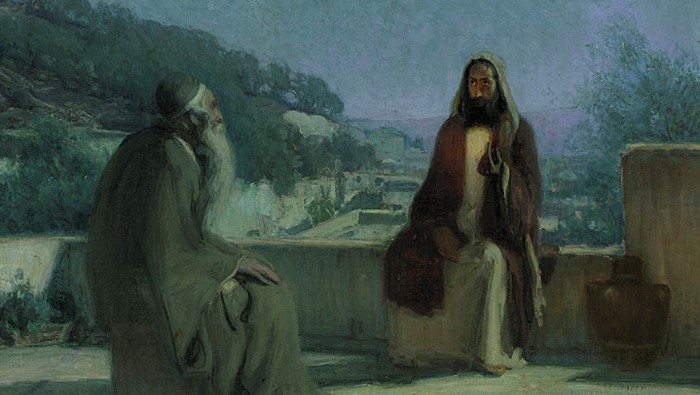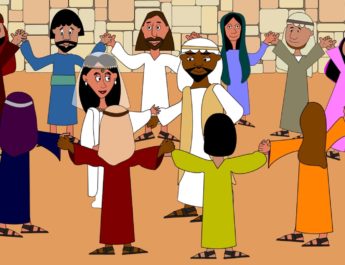John 3:1-17
Trinity Sunday B27
1 Now there was a PhariseeA namedB Nicodemus,C a leaderD of the Jews.E
A “Pharisee” = anthropos + ek + ho + pharisaios. Literally “a man from the Pharisees.” Anthropos is probably from aner (man, male, husband) + ops (eye, face). This is human, humankind. Used for all genders. Pharisaios is from Aramaic peras (to divide, separate) and from Hebrew parash (to make distinct, separate, scatter). This is a Pharisee, a member of a Jewish sect active in the 1st century. Their name meant separate in the sense of wanting to live a life separated from sin. Whereas the Sadducees were part of the priestly line and inherited their religious position and responsibilities, Pharisees were regular people who studied the scriptures and offered guidance to regular folk. Sadducees were often wealthier and willing to sacrifice their identity to rub elbows with Roman society. Pharisees were often more concerned with what it meant to follow God without compromising what made them different as followers of God. Sadducees primarily believed in that which was written down (the first five books of the Bible) and Pharisees believed in the Bible and the traditions of the elders. Pharisees had a very wide range of interpretations and diversity of opinion. Their standard mode of religion engagement was lively debate with one another. To argue religion with another teacher was to recognize that they had something of value to offer.
B “named” = onoma. May be from ginosko (know, recognize, learn from firsthand experience). This is a name, authority, cause, character, fame, reputation. The name was thought to include something of the essence of the person so it was not thought to be separate from the person.
C “Nicodemus” = nikodemos. 5x in NT. From nikos (victory, triumph – especially a conquest); {from nike (victory, conquest; figurative for what makes one successful)} + demos (district, multitude, rabble, assembly; Greeks bound by similar laws or customs); {from deo (to tie, bind, compel, declare unlawful)}. This is Nicodemus, meaning “victorious among his people.”
D “leader” = archon. From archo (to rule, begin, have first rank or have political power). This is ruler, leader, magistrate, official, prince, chief.
E “Jews” = ioudaios. From Ioudas (Judah, Judas); from Hebrew Yehudah (Judah, son of Jacob, his tribal descendants, a name for the southern kingdom. Literally, it means praised); probably from yadah (to throw one’s hands into the air in a gesture of praise); from yad (hand). This is Jewish, a Jew, or Judea.
2 He came to Jesus by night and said to him, “Rabbi,F we know that you are a teacher who has come from God;G for no one can do these signsH that you do apart from the presenceI of God.”
F “Rabbi” = rhabbi. 15x in NT. From Hebrew rab (chief); from rabab (to be many, increase, multiply). This is a title of respect for a teacher-scholar. Literally, it means great one or honorable sir. It can also be understood as my master or my teacher.
G “God” = theos. From Proto-Indo-European origins, meaning do, put, place. This is God or a god in general.
H “signs” = semeion. From the same as semaino (to give a sign, signify, indicate, make known); from sema (a sign or mark). This is a sign given by God to confirm or authenticate a message or prophecy. It is not necessarily miraculous, but it can be. The Gospel of John generally uses this word instead of miracle.
I “presence” = meta. This is with, among, after, behind, beyond.
3 JesusJ answered him, “Very truly,K I tell you, no one can see the kingdom of God without being bornL from above.”M
J “Jesus” = iesous. From Hebrew Yehoshua (Joshua, the Lord is salvation); from YHVH (proper name of the God of Israel; the self-existent and eternal one); from havah (to become) or from hayah (to come to pass, become, be) + yasha (to deliver, defend, help, preserve, rescue; properly, to be open, wide or free, which implies being safe. So, in a causative sense, this is to free someone). This is Jesus or Joshua in Greek – the Lord saves or the Lord is salvation.
K “very truly” = amen + amen. From Hebrew amen (verily, truly, amen, truth, so be it, faithfulness); from aman (to believe, endure, fulfill, confirm, support, be faithful, put one’s trust in, be steadfast. Figuratively, this is to be firm, steadfast, or faithful, trusting, believing, being permanent, morally solid). This word is literally firmness, but figuratively fidelity, faithfulness, honesty, responsibility, trust, truth, steadfastness. Properly, it is to be sure, certain, or firm. This is a word of emphasis indicating that something crucial follows.
L “being born” = gennao. From genna (descent, birth); from genos (family, offspring, kin – in a literal or figurative sense); from ginomai (to come into being, to happen, become, be born; to emerge from one state or condition to another; this is coming into being with the sense of movement or growth). This is to beget, give birth to, or bring forth. Properly, it refers to procreation by the father, but was used of the mother by extension. Figuratively, this can mean to regenerate.
M “from above” = anothen. 13x in NT. From ano (up, above, up to the top, things above, heaven); from ana (up, upwards, again, back, among, anew). This is from above, from the top, again, beginning, from the source. It implies anew.
4 Nicodemus said to him, “How can anyone be born after having grown old?N Can one enter a second time into the mother’s wombO and be born?”
5 Jesus answered, “Very truly, I tell you, no one can enter the kingdom of God without being born of water and Spirit.P 6 What is born of the fleshQ is flesh, and what is born of the Spirit is spirit.
N “old” = geron. 1x in NT. This is old or aged. It is where “gerontology” comes from.
O “womb” = koilia. From koilos (hollow). This is a broad term for an organ in the abdomen such as the heart, stomach, or womb. It can also be used more broadly to mean belly.
P “Spirit” = pneuma. From pneo (to blow, breath, breathe hard). This is wind, breath, or ghost. A breeze or a blast or air, a breath. Figuratively used for a spirit, the human soul or part of us that is rational. It is also used supernaturally for angels, demons, God, and the Holy Spirit. This is where pneumonia comes from.
Q “flesh” = sarx. May be from saroo (to sweep, cleanse by sweeping); from sairo (to brush off). This is flesh, the body, human nature, materiality, kindred. Flesh is not always evil in scripture (as when it refer to Jesus taking on a human body). However, it is generally used in a negative way for actions made selfishly and not through faith. This can mean animal flesh, i.e. meat, or refer to body in contrast to soul/spirit. Flesh can be a way of talking about how things or people are related or talking about human frailty (physical or moral).
7 Do not be astonishedR that I said to you, ‘You mustS be born from above.’ 8 The windT blowsU where it chooses,V and you hear the sound of it, but you do not know where it comes from or where it goes.W So it is with everyone who is born of the Spirit.”
9 Nicodemus said to him, “How can these things be?”X
R “astonished” = thaumazo. From thauma (a wonder or marvel; used abstractly for wonderment or amazement; something that evokes emotional astonishment); may be from theaomai (to behold, look upon, see, contemplate, visit); from thaomai (to gaze at a spectacle; to look at or contemplate as a spectator; to interpret something in efforts to grasp its significance). This is to marvel, wonder, or admire. To be amazed out of one’s senses or be awestruck. Being astonished and starting to contemplate what was beheld. This root is where the word “theatre” comes from.
S “must” = dei. From deo (to tie, bind, compel; declare unlawful). This is what is necessary or proper. It is what is needed or what one should do – a duty or something inevitable. This refers to something absolutely necessary.
T “wind” = pneuma. Same as “spirit” in v5.
U “blows” = pneo. Related to “spirit” in v5. See note P above. Literally, then, this could read “the spirit, where it chooses, spirits.”
V “chooses” = thelo. This is to wish, desire, will, or intend. It is to choose or prefer in a literal or figurative sense. It can also mean inclined toward or take delight in. It can have a sense of being ready to act on the impulse in question.
W “goes” = hupago. From hupo (by, under, under the authority of) + ago (lead, bring, guide, spend, drive, carry). This is to lead under so to depart, go away, or die. It is to lead away under the command of someone else, being given a mission or objective to carry out.
X “be” = ginomai. Related to “born” in v3. See note L above. This is to come into being, to happen, become, be born; to emerge from one state or condition to another. This is coming into being with the sense of movement or growth.
10 Jesus answered him, “Are you a teacher of Israel,Y and yet you do not understandZ these things?
11 “Very truly, I tell you, we speak of what we know and testifyAA to what we have seen; yet you do not receive our testimony.BB 12 If I have told you about earthlyCC things and you do not believe,DD how can you believe if I tell you about heavenlyEE things?
Y “Israel” = yisrael. From Hebrew Yisrael (God strives or one who strives with God; new name for Jacob and for his offspring); from sarah (to persist, exert oneself, contend, persevere, wrestle, prevail) + el (God or god). This is Israel the people and the land.
Z “understand” = ginosko. This is to know, recognize, realize, perceive, learn. It is knowledge gained through personal experience
AA “testify” = martureo. From martus (a witness whether having heard or seen something; witness literally, judicially, or figuratively; by analogy, a martyr). This is to bear witness, testify, give evidence. It means to testify in a literal or figurative sense. This root is where we get the word “martyr” from.
BB “testimony” = marturia. Related to “testify” in v11. From martureo (see note AA above). This is testimony, witness, evidence, record, reputation.
CC “earthly” = epigeios. 7x in NT. From epi (on, upon, what is fitting) + ge (earth, land, soil, region, country, the inhabitants of an area). This is earthly or worldly. It can mark the earth in contrast to the sky or the earth in contrast to heaven. It can include all of physical life or describe the moral character of the world.
DD “believe” = pisteuo. From pistis (faith, faithfulness, belief, trust, confidence; to be persuaded or come to trust); from peitho (to have confidence, urge, be persuaded, agree, assure, believe, have confidence, trust). This is to believe, entrust, have faith it, affirm, have confidence in. This is less to do with a series of beliefs or doctrines that one believes and more to do with faithfulness, loyalty, and fidelity. It is trusting and then acting based on that trust.
EE “heavenly” = epouranios. 19x in NT. From epi (on, upon, what is fitting) + ouranos (air, sky, the atmosphere, heaven; the sky that is visible; the spiritual heaven where God dwells; implies happiness, power, and eternity); {perhaps from oros (mountain, hill)}. This is heavenly, celestial, high, heavenly one, heavenly thins. It is the heavenly sphere in contrast to the earthly one, the place of spiritual activity. Figuratively, it can mean divine or spiritual. Properly, this describes that which is fitting from heaven’s perspective.
13 No one has ascended into heavenFF except the one who descended from heaven, the Son of Man.GG 14 And just as MosesHH lifted upII the serpentJJ in the wilderness,KK so must the Son of Man be lifted up, 15 that whoever believes in him may have eternalLL life.MM
FF “heaven” = ouranos. Related to “heavenly” in v12. See note EE above.
GG “Man” = anthropos. Probably from aner (man, male, husband) + ops (eye, face). This is human, humankind. Used for all genders.
HH “Moses” = mouses. From Hebrew Mosheh (Moses); from mashah (to pull out in a literal or figurative sense, to draw out) OR from Egyptian mes or mesu (child, son i.e. child of…). This is Moses – the one drawn out from the water, which is to say, rescued. If derived from the Egyptian, his name would share a root with Rameses and Thutmose.
II “lifted up” = hupsoo. From hupsos (height, high position, heaven, dignity, eminence; elevation, altitude; to be exalted); from hupsi (on high, aloft); from huper (over, above, beyond). This is to elevate in a literal or figurative sense. So, it could be to raise up or set something in a high place or to exalt or make something great.
JJ “serpent” = ophis. 14x in NT. Perhaps from optanomai (to be seen, to gaze at something with eyes wide open, to see something remarkable). This is snake or serpent, often used of the devil. It is the snake as a type that is sly or cunning – someone malicious.
KK “wilderness” = eremos. Properly, a place that is not settled or farmed, not populated. It could be a deserted area or a desert place. It could be seen as secluded, solitary, or lonesome. Any kind of vegetation is sparse, but so are people generally.
LL “eternal” = aionios. From aion (an age, length of time). This is age-long, forever, everlasting. Properly, that which lasts for an age. This is where eon comes from.
MM “life” = zoe. From zao (to live, be alive). This is life including the vitality of humans, plants, and animals – it is life physical and spiritual and life everlasting.
16 “For God so lovedNN the worldOO thatPP he gave his onlyQQ Son, so that everyone who believes in him may not perishRR but may have eternal life.
17 “Indeed, God did not sendSS the Son into the world to condemnTT the world, but in order that the world might be savedUU through him.
NN “loved” = agapao. Perhaps from agan (much). This is love, longing for, taking pleasure in. It is divine love or human love that echoes divine love.
OO “world” = kosmos. Perhaps from the base of komizo (to carry, convey, recover); from komeo (to take care of). This is order, the world, the universe, including its inhabitants. Literally, this is something that is ordered so it can refer to all creation. It can also refer to decoration in the sense that something is better ordered and, thus, made more beautiful. This is were “cosmos” and “cosmetics” come from.
PP “that” = hoste. From hos (as, like, when, since, as long as); {from hos (who, which, that)} + te (and, and both). This is so then, so as to, therefore. This clause makes a connection between a cause and its effect which places emphasis on the result. This the fulcrum or turning point of what must happen given the relationship of what has come before and what follows.
QQ “only” = monogenes. Related to “being born” in v3. 9x in NT. From monos (alone, only, solitary, sole, mere, desolate); {probably from meno (to stay, remain, wait, continue, endure)} + genos (see note L above). This is only begotten, unique, one and only, one of a kind.
RR “perish” = apollumi. From apo (from, away from) + ollumi (to destroy or ruin; the loss that comes from a major ruination). This is to destroy, cut off, to perish – perhaps violently. It can also mean to cancel or remove.
SS “send” = apostello. From apo (from, away from) + stello (to send, set, arrange, prepare, gather up) [probably from histemi (to make to stand, stand, place, set up, establish, appoint, stand firm, be steadfast]. This is to send forth, send away, dismiss, send as a messenger. It implies one that is sent for a particular mission or purpose rather than a quick errand. This is where “apostle” comes from.
TT “condemn” = krino. To judge, decide, think good, condemn, determine, pass judgment, stand trial, sue. This is judging whether it is done in court or in a private setting. Properly, it refers to mentally separating or distinguishing an issue – to come to a choice or decision, to judge positively or negatively in seeking what is right or wrong, who is innocent or guilty. It can imply trying, condemning, punishing, or avenging.
UU “saved” = sozo. From sos (safe, rescued, well). This is to save, heal, preserve, or rescue. Properly, this is taking someone from danger to safety. It can be delivering or protecting literally or figuratively.
Image Credit: “Nicodemus and Jesus on a Rooftop” by Henry Ossawa Tanner, 1899.




